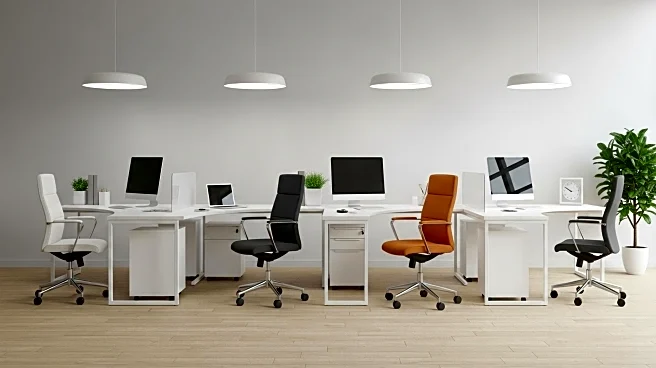What is the story about?
What's Happening?
CBRE, a commercial real estate services firm, has released a report emphasizing the importance of workplace experience in driving real estate value. The report, part of CBRE's 2024-2025 Global Workplace & Occupancy Insights series, suggests that traditional office designs are becoming obsolete. Modern workplaces are integrating biophilic design elements and curated amenities to enhance employee satisfaction and operational efficiency. The report highlights the need to consider regional and generational differences, as well as gender preferences, in workplace design. According to CBRE, seasoned professionals focus on practical applications and data-driven metrics, while emerging talent prioritizes company culture and employee experience. Additionally, a report by Cushman & Wakefield notes that men prefer office environments for social connections, whereas women opt for remote work for better focus and work-life balance.
Why It's Important?
The findings underscore the evolving dynamics of workplace design, which are crucial for attracting and retaining talent in a competitive market. As organizations strengthen return-to-office mandates, understanding generational and gender preferences becomes vital for creating inclusive and productive environments. The shift towards personalized workplace solutions reflects broader societal changes in work-life balance and employee expectations. Companies that successfully adapt to these preferences may see improved employee satisfaction and productivity, ultimately enhancing their business outcomes. The emphasis on technology, such as AI-powered analytics, further highlights the role of innovation in managing modern workspaces.
What's Next?
Organizations are likely to continue refining their workplace strategies to accommodate diverse employee needs. As preferences evolve, companies will need to monitor feedback and adjust their designs to remain relevant and inclusive. The trend towards increased in-office attendance may persist, with high-profile companies like Paramount adopting a five-day-a-week model. However, hybrid work arrangements are expected to remain prevalent, necessitating ongoing investment in technology to support flexible work environments. Stakeholders, including employers and real estate firms, will need to collaborate to ensure that workplace designs align with shifting professional and personal realities.
Beyond the Headlines
The focus on personalized workplace solutions raises ethical considerations regarding equity and inclusivity. As companies tailor their approaches to different groups, they must ensure that all employees have access to environments that support their unique needs. This shift may also influence broader cultural attitudes towards work-life balance and the role of physical office spaces in professional life. Long-term, these changes could lead to a reevaluation of traditional work models and the development of new standards for workplace design.
















